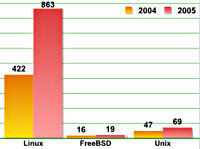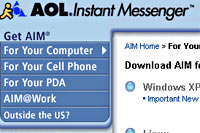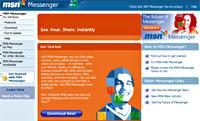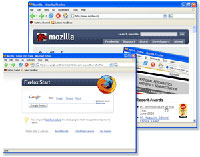 “Today’s state of the art in spam control solutions is far ahead of where it was, say, two years ago. Improved spam filters being available to more people — plus laws that allow the citizenry to penalise spammers — will cause the scourge of email spam to wither and die.”
“Today’s state of the art in spam control solutions is far ahead of where it was, say, two years ago. Improved spam filters being available to more people — plus laws that allow the citizenry to penalise spammers — will cause the scourge of email spam to wither and die.”
Yes, it’s the issue of paid-for spam, as many have called it, as proposed by Goodmail. It’s been hailed, controversially, by American IT pundit Esther Dyson, who told New York Times readers that the “barrage of criticism” launched at the idea was wrong.
“These organisations seem to think that all Internet mail must always be free, just because it was free before. Yet they pay for computers and Internet access and office supplies, just like everyone else,” Dyson wrote.
Today, email expert Richi Jennings of Ferris Research retorts that the problem isn’t as bad as that. Where Dyson says “Pretty soon, all mail will cost money, but I think that’s only right…” Jennings says: “While we see a role for companies such as Goodmail, we don’t agree that ‘most’ email will cost money in the future, and it’s not ‘only right’ because the fact that email is free is part of its appeal.”
Dyson’s argument, says Jennings, “stands or falls on the assertion that today’s spam filters aren’t working. Jennings and Ferris Research think the opposite is true.
Time will tell, of course, but Dyson’s vision of the future is that there will be more and more Goodmail competitors.
 The Goodmail idea is simple enough; you create a world in which only mail from known sources gets through. You and I, as mail users, tell our email system that if we don’t have someone’s name in the address book, then it’s spam. And our email system then says: “I’ve been given money to let this person through” and we say: “Well, I trust my email system.”
The Goodmail idea is simple enough; you create a world in which only mail from known sources gets through. You and I, as mail users, tell our email system that if we don’t have someone’s name in the address book, then it’s spam. And our email system then says: “I’ve been given money to let this person through” and we say: “Well, I trust my email system.”
There is one reason to presume that this system is better; and that’s the sheer volume of spam today. In theory, anybody could send a viagra advert through the paid system – but it would involve a complete change in the way spammers finance themselves. They work on the assumption that they can as easily send six million messages as sixty million as six hundred million; and if only 0.001% of mails get a reply, they’re in big business.
Goodmail (and its rivals) reckon that they can turn that free six hundred million messages into something that costs half a million dollars to send. And they also reckon that we’ll find a way of ignoring the spammers, and that they won’t be able to break through.
It’s that last question that I’d query. Can we really make the world’s email system insist on authenticating all email? Or are we still stuck with a system which allows “spoofing” of mail, so that spam will simply arrive in our mailboxes looking like it’s from real friends?
Esther is definitely right about one thing. There’s absolutely no threat to anybody from Goodmail. Yes, it will mean that people will send advertising to you; but the problem with advertising isn’t just “it’s advertising!” – it’s the amount.
One advert a day, I probably won’t notice. It’s three hundred a day that makes email unmanageable; and no marketing operation can afford to send three hundred emails to every user on the planet every day, if it costs on a per-mail basis.
If Goodmail changes advertising from 300 a day to one a day, then nobody will mind. If paid-for mail still runs at 300 a day, people will drop AOL and other Goodmail customers, and move to other ISPs who don’t allow it. I’m with Dyson on this: the market will sort that one out.
 Barely a month after buying up software developers @Last Software, Google have released a free version of their popular 3D-modelling application SketchUp.
Barely a month after buying up software developers @Last Software, Google have released a free version of their popular 3D-modelling application SketchUp. Details, textures and glass can also be added to models, which can then be uploaded onto Google Earth or shared with fellow modelling aficionados by posting them to the 3D Warehouse – a new site where SketchUp users can store, share and collaborate on designs.
Details, textures and glass can also be added to models, which can then be uploaded onto Google Earth or shared with fellow modelling aficionados by posting them to the 3D Warehouse – a new site where SketchUp users can store, share and collaborate on designs. Uber music giants EMI Music Publishing have announced a deal with hotshot VoIP upstarts Skype to sell music on Skype’s new retail website.
Uber music giants EMI Music Publishing have announced a deal with hotshot VoIP upstarts Skype to sell music on Skype’s new retail website. Roger Faxon co-CEO of EMI Music Publishing was ready and willing for some Monday morning gushing, dishing out the kudos to Skype, EMI and composer royalty collectors the MCPS-PRS Alliance for their help.
Roger Faxon co-CEO of EMI Music Publishing was ready and willing for some Monday morning gushing, dishing out the kudos to Skype, EMI and composer royalty collectors the MCPS-PRS Alliance for their help. Attacks against non-Windows operating systems – particularly Linux – are growing quickly, according to a Kaspersky Lab report.
Attacks against non-Windows operating systems – particularly Linux – are growing quickly, according to a Kaspersky Lab report. Those Mac bugs
Those Mac bugs In the seemingly endless round of upgrades and improvements, Opera Software have just announced the first public Beta of Opera 9.
In the seemingly endless round of upgrades and improvements, Opera Software have just announced the first public Beta of Opera 9. Among the other features in the new version are
Among the other features in the new version are In the world of online commerce, uptime is money, so it was surprising to see a new report by WatchMouse showing that 57% of the FTSE 100 websites were offering availability below industry standards
In the world of online commerce, uptime is money, so it was surprising to see a new report by WatchMouse showing that 57% of the FTSE 100 websites were offering availability below industry standards With an uptime of 99.9% seen as the industry standard (minimum acceptable level), there were fourteen sites which achieved perfect 100% availability, while the worst two performers couldn’t even muster 91% availability (Scottish Power with 90.78% and United Utilities with a lamentable 81.53%).
With an uptime of 99.9% seen as the industry standard (minimum acceptable level), there were fourteen sites which achieved perfect 100% availability, while the worst two performers couldn’t even muster 91% availability (Scottish Power with 90.78% and United Utilities with a lamentable 81.53%). Search giant Google has announced a free, Web-based ‘shareable’ calendar service called, appropriately enough, Google Calendar, which allows users to post up events and share them with others.
Search giant Google has announced a free, Web-based ‘shareable’ calendar service called, appropriately enough, Google Calendar, which allows users to post up events and share them with others. Gmail Integration
Gmail Integration Based on open calendar standards, events can be imported from popular programs like Microsoft Outlook and Apple iCal, while schedules can be viewed by any external application or device that accepts iCal or XML files.
Based on open calendar standards, events can be imported from popular programs like Microsoft Outlook and Apple iCal, while schedules can be viewed by any external application or device that accepts iCal or XML files. According to a new study by comScore Networks, 82 million people – that’s nearly half of the European online population – used IM applications to chat online during February.
According to a new study by comScore Networks, 82 million people – that’s nearly half of the European online population – used IM applications to chat online during February. In Latin America and Europe, Messenger ruled supreme, registering usage rates of 90 percent and 70 percent (respectively) of IM users.
In Latin America and Europe, Messenger ruled supreme, registering usage rates of 90 percent and 70 percent (respectively) of IM users. The VoIP/IM client application is proving to be a real hit in the Asia Pacific, where it has already garnered 26 percent of IM users, although it’s a different story in North America, where Skype can only claim 3 percent of the online population.
The VoIP/IM client application is proving to be a real hit in the Asia Pacific, where it has already garnered 26 percent of IM users, although it’s a different story in North America, where Skype can only claim 3 percent of the online population. Spurred on by the huge rise of original content being created for computers and mobile devices, The National Academy of Television Arts & Sciences has decided to officially recognise the growing medium.
Spurred on by the huge rise of original content being created for computers and mobile devices, The National Academy of Television Arts & Sciences has decided to officially recognise the growing medium. Donning our best party frock, we’re delighted to stand up to the podium and announce the nominees:
Donning our best party frock, we’re delighted to stand up to the podium and announce the nominees: Live 8 on AOL – live feeds and on-demand footage of last year’s enormo charity gig.
Live 8 on AOL – live feeds and on-demand footage of last year’s enormo charity gig. Mozilla’s Firefox continues to bite into Internet Explorer’s once-unassailable market dominance, snaffling 10 percent of the Web browser market in March, according to Web audience measurement firm Net Applications.
Mozilla’s Firefox continues to bite into Internet Explorer’s once-unassailable market dominance, snaffling 10 percent of the Web browser market in March, according to Web audience measurement firm Net Applications. Firefox’s rise has been slow but inexorable, with the improved feature set of version 1.5 helping them garner a 3.34 percent share over the year.
Firefox’s rise has been slow but inexorable, with the improved feature set of version 1.5 helping them garner a 3.34 percent share over the year. Get optimising!
Get optimising! “Today’s state of the art in spam control solutions is far ahead of where it was, say, two years ago. Improved spam filters being available to more people — plus laws that allow the citizenry to penalise spammers — will cause the scourge of email spam to wither and die.”
“Today’s state of the art in spam control solutions is far ahead of where it was, say, two years ago. Improved spam filters being available to more people — plus laws that allow the citizenry to penalise spammers — will cause the scourge of email spam to wither and die.” The Goodmail idea is simple enough; you create a world in which only mail from known sources gets through. You and I, as mail users, tell our email system that if we don’t have someone’s name in the address book, then it’s spam. And our email system then says: “I’ve been given money to let this person through” and we say: “Well, I trust my email system.”
The Goodmail idea is simple enough; you create a world in which only mail from known sources gets through. You and I, as mail users, tell our email system that if we don’t have someone’s name in the address book, then it’s spam. And our email system then says: “I’ve been given money to let this person through” and we say: “Well, I trust my email system.”